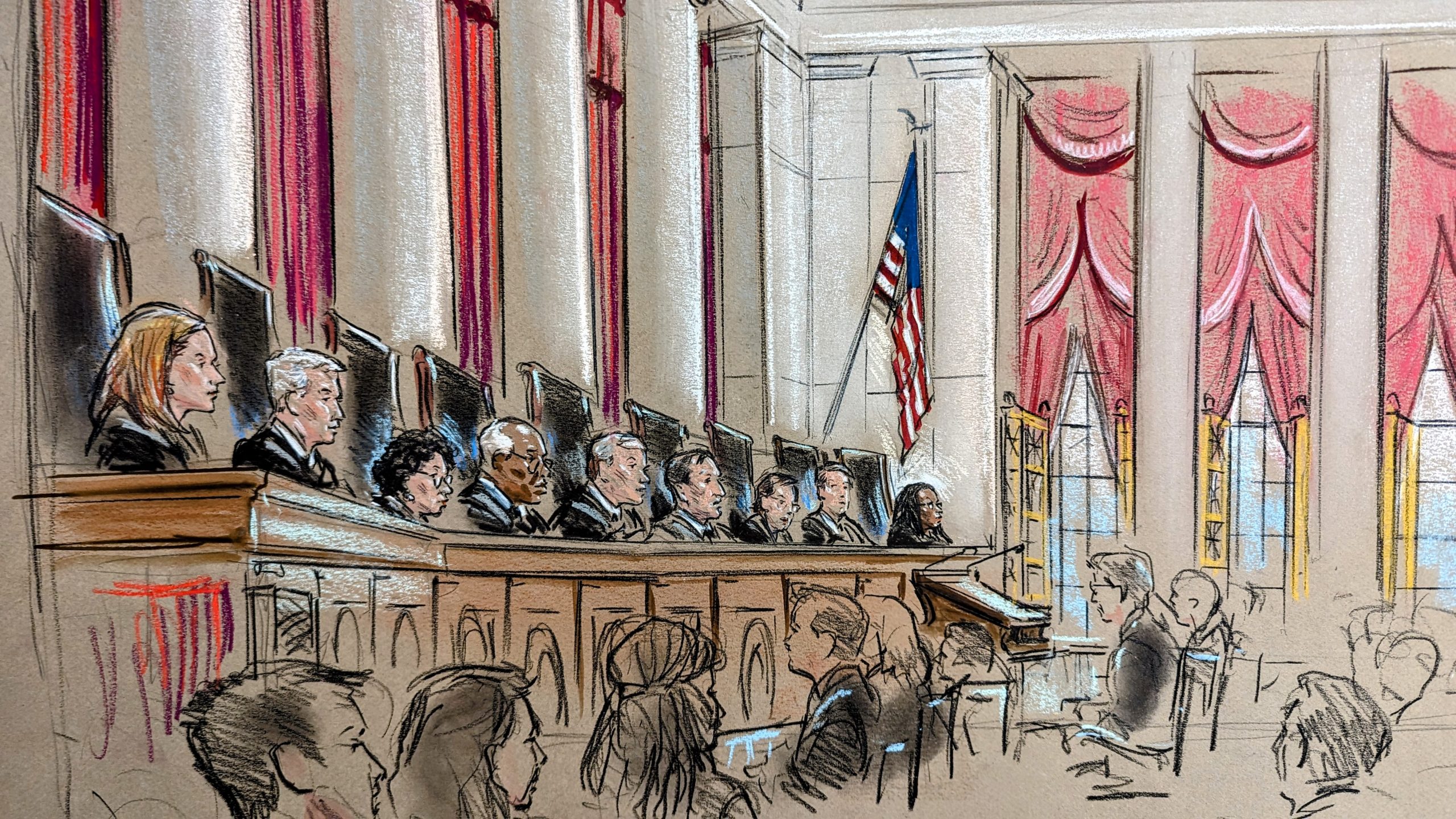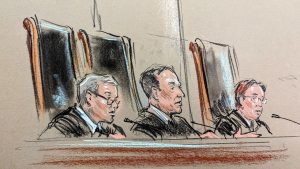Supreme Court strikes down Biden student-loan forgiveness program


This article was updated on June 30 at 4:00 p.m.
By a vote of 6-3, the justices ruled that the Biden administration overstepped its authority last year when it announced that it would cancel up to $400 billion in student loans. The Biden administration had said that as many as 43 million Americans would have benefitted from the loan forgiveness program; almost half of those borrowers would have had all of their student loans forgiven.
Chief Justice John Roberts wrote for the court in Biden v. Nebraska, characterizing the decision as a straightforward interpretation of federal law.
Justice Elena Kagan dissented, in an opinion joined by Justices Sonia Sotomayor and Ketanji Brown Jackson.
When the Biden administration announced the program in August 2022, student-loan repayments had already been on hold for over two years. Betsy DeVos, who served as the secretary of education during the Trump administration, suspended both repayments and the accrual of interest on federal student loans at the start of the COVID-19 pandemic. She relied on the HEROES Act, a law passed in the wake of the Sept. 11 attacks that gives the secretary of education the power to respond to a national emergency by “waiv[ing] or modify[ing] any statutory or regulatory provision” governing the student-loan programs so that borrowers are not worse off financially because of the emergency.
President Joe Biden’s decision to permanently cancel up to $20,000 in loans for borrowers who qualify would have fulfilled a pledge that he made during his 2020 run for president. But after federal courts in Missouri and Texas put the program on hold last year, the Biden administration came to the Supreme Court, asking the justices to weigh in.
The challengers – six states with Republican attorneys general and two individuals with student loans — had urged the justices to strike down the debt-relief plan, arguing that it does not comply with the HEROES Act and other federal laws. But before the court could reach that question, it had to determine whether any of the challengers had a legal right to sue, known as standing.
To challenge a government policy in federal court, it is not enough that a plaintiff disagrees with the policy. Instead, the plaintiff must show (among other things) that she has been injured by the policy. If there is more than one plaintiff in a lawsuit, it can go forward as long as at least one plaintiff has standing.
In a 15-page opinion issued shortly before the Roberts opinion in Biden v. Nebraska, the court ruled unanimously in Department of Education v. Brown that two individual borrowers lacked standing to challenge the debt-relief plan.
But in the states’ case, the U.S. Court of Appeals for the 8th Circuit ruled last year that Missouri has a right to sue because it created and controls the Missouri Higher Education Loan Authority, one of the country’s largest servicers and holders of student loans. If the debt-relief program goes into effect, the states contended, it could cost MOHELA as much as $44 million per year, which will in turn limit the company’s ability to contribute funds to support the state’s higher-education programs.

On Friday the justices upheld that ruling, finding that Missouri has standing to challenge the debt-relief program because the financial harms to MOHELA from the program will also harm Missouri. Missouri created MOHELA to help state residents obtain student loans to pay for college, Roberts reasoned. It is operated by “state officials and state appointees, reports to the State, and may be dissolved by the State.” If the debt-relief program goes into effect, he observed, MOHELA’s revenues will fall, “impairing its efforts to aid Missouri college students” – which in turn “is necessarily a direct injury to Missouri itself.”
Having determined that Missouri (and therefore the rest of the states) had a right to challenge the debt-relief program, the court then turned to the heart of the case – whether the debt-relief program complies with federal law. Here the court agreed with the challengers that it did not. The HEROES Act, Roberts emphasized, gives the secretary of education the power to “waive or modify” laws and regulations governing the student-loan programs. Congress’s use of the word “modify” means that the Biden administration can make “modest adjustments and additions to existing provisions,” Roberts wrote, “not transform them.” But the debt-relief program, Roberts stressed, instead “created a novel and fundamentally different loan forgiveness program.” The plan “modifies” student-loan laws and regulations, Roberts suggested, “only in the same sense that the French Revolution ‘modified’ the status of the French nobility — it has abolished them and supplanted them with a new regime entirely.”
Roberts rejected the Biden administration’s contention that the secretary of education also has the power to “waive” laws and regulations relating to the student-loan program. When the secretary has invoked this power in the past, Roberts observed, he has done so for a specific legal requirement, such as the requirement that a student provide a written request for a leave of absence. But in this case, Roberts noted, the secretary has not indicated that he is waiving a specific provision.
Roberts also rebuffed the Biden administration’s argument that the debt-relief program is consistent with the purpose of the HEROES Act – that is, to give the secretary of education the power to provide relief to borrowers during a national emergency. “The question here,” Roberts countered, “is not whether something should be done; it is who has the authority to do it.” On this point, Roberts invoked the “major questions” doctrine, which is the idea that if Congress wants to give an administrative agency the power to make decisions of vast economic or political significance, it must say so clearly. But in this case, Roberts said, the HEROES Act did not authorize the debt-relief program at all, much less clearly.
Roberts concluded his 26-page opinion with a broader discussion of the dynamics on the court that appeared to be directed at both his dissenting colleagues and concerns about public perception of the court more broadly. “It has become a disturbing feature of some recent opinions,” Roberts wrote, “to criticize the decisions with which they disagree as going beyond the proper role of the judiciary.” But Friday’s decision, Roberts insisted, relied on “traditional tools of judicial decisionmaking.” Although “[r]easonable minds may disagree with our analysis,” including the court’s liberal justices,” Roberts acknowledged, “[w]e do not mistake this plainly heartfelt disagreement for disparagement. It is important that the public not be misled either. Any such misperception would be harmful to this institution and our country.”
Barrett joined the Roberts opinion but also wrote a separate concurring opinion in which she emphasized that the major questions doctrine “reinforces” the court’s conclusion that the HEROES Act does not give the Biden administration the power to adopt the debt-relief plan “but is not necessary” for it to reach that conclusion.
Barrett then discussed the major questions doctrine more generally, indicating that she took “seriously the charge” – made by Kagan in an opinion last year – “that the doctrine is inconsistent with textualism.” For Barrett, the doctrine is a tool that judges should use to try to determine “the text’s most natural interpretation.” And in particular, she suggested, judges should use common sense about whether this is the kind of question that Congress would have intended to delegate to an administrative agency. In this case, Barrett continued, it does appear that the Biden administration “has gone far ‘beyond what Congress could reasonably be understood to have granted’ in the HEROES Act.”
In Kagan’s view, the court should not have reached the merits of the states’ claims at all because none of the states had standing. The theory of standing advanced by the states, and accepted by the majority, she explained, “points to MOHELA as the proper plaintiff,” because MOHELA – rather than Missouri – would be injured by the debt-relief plan. But although MOHELA could have filed its own lawsuit, it did not, she stressed.
In any event, she continued, the debt-relief plan is authorized by the text of the HEROES Act. The act, she contended, “provides the Secretary with broad authority to give emergency relief to student-loan borrowers, including by altering usual discharge rules” – precisely what the Biden administration did. The majority reaches the opposite conclusion, she contended, only by “picking the statute apart, and addressing each segment of Congress’s authorization as if it had nothing to do with the others.” That construction, she wrote, “makes the Act inconsequential,” leaving the secretary “with no ability to respond to large-scale emergencies in commensurate ways.”
Kagan also took aim at the court’s invocation of the major questions doctrine, arguing that Friday’s decision reflects “the Court’s own ‘concerns over the exercise of administrative power.'” Kagan explained that Congress “delegates to agencies often and broadly” for a variety of reasons, ranging from the expertise of those agencies to their ability to keep up with changing times and circumstances and the limits on Congress’s own ability to address everything that needs to be done. The Supreme Court’s reliance on the major questions doctrine, Kagan asserted, overrules Congress’s decisions about when and how to delegate. “And that is a major problem,” Kagan argued, “not just for governance, but for democracy too,” because when the Supreme Court steps in, it “becomes the arbiter — indeed, the maker — of national policy.”
In a statement issued by the White House, President Joe Biden called the court’s decision “wrong” and promised that “[t]his fight is not over.” He indicated that he planned to discuss the decision and “provide more detail on all that my Administration has done to help students and the next steps my Administration will take” in an address on Friday afternoon.
Nebraska Attorney General Mike Hilgers, one of the state officials who brought the challenge to the program, praised the decision. In a statement, Hilgers said that Friday’s decision “is a timely reminder that the President is no king” but must instead “work with, and not around, Congress.” “Our elected federal representatives are closest to the people, have the power of the purse, and are entrusted with the responsibility of tackling difficult policy issues.”
This article was originally published at Howe on the Court.
Posted in Merits Cases
Cases: Biden v. Nebraska, Department of Education v. Brown